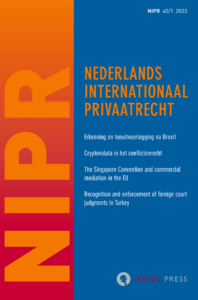Netherlands PIL journal (NIPR) – issue 2022(1)
 The latest edition of the Dutch journal on private international law (NIPR) includes the following papers:
The latest edition of the Dutch journal on private international law (NIPR) includes the following papers:
Editorial:
Van der Grinten, Erkenning en tenuitvoerlegging na Brexit: de rechtzoekende als verliezer / p. 1-6
Abstract
In this editorial the author gives a short overview of the possible instruments to be used for the recognition and enforcement of judgments by Dutch courts in the UK and vice versa after Brexit. The author’s conclusion is that the losers in Brexit, sadly, are the citizens of both states.
Articles
Henckel, Cryptovaluta in het conflictenrecht: een verkenning / p. 7-27
Abstract
This article comprises of a reconnaissance of the conflict of laws aspects associated with cryptocurrencies under the Dutch conflict of laws. Cryptocurrencies are founded on new technologies that are unencumbered by borders or central authority, which makes them resistant to traditional rules of private international law that require a connection to a geographic location. A potential major problem may therefore lie in integrating cryptocurrencies into the existing conflict of laws system. This article provides an overview of how cryptocurrencies fit into the existing Dutch conflict of laws system and discusses existing problem areas.
Rosner, The Singapore Convention and commercial mediation in the EU / p. 28-36
Abstract
This article presents an insider’s view of the United Nations Convention on International Settlement Agreements Resulting from Mediation (the ‘Singapore Convention’), from the inception phase of the project within the framework of the United Nations Commission on International Trade Law (‘UNCITRAL’) to the negotiation phase and its adoption in 2018. The article equally presents the main features of this new international system and shows how the EU and its Member States view the enforcement of mediated settlement agreements and the reasons for such positions.
The article continues with a presentation of the current EU legislative framework for commercial mediation, with an emphasis on the enforcement of mediated settlement agreements, including a comparison between the intra-EU regulation of this matter and the enforcement system under the Singapore Convention. A few reflections follow on the compatibility of the two systems, both from a legal viewpoint and from a policy perspective.
The article is concluded with a few general remarks on the role of mediation in resolving (international) commercial disputes.
Foreign pil
Z.D. Tarman, Recognition and enforcement of foreign court judgments in civil and commercial matters before Turkish courts: frequently encountered legal problems and proposed solutions / p. 37-54
Abstract
An efficient process for the recognition and enforcement of foreign court judgments in civil and commercial matters is even more significant in our globalized world for both individuals and businesses involved in cross-border litigation. However, under Turkish legal practice parties repeatedly face certain difficulties arising from disputed procedural issues. This paper examines certain frequently encountered legal problems in Turkish legal practice regarding the recognition and enforcement of foreign court judgments and aims to propose solutions to ameliorate legal practice in Turkey. In this regard the paper gives a general overview of the recognition and enforcement system under Turkish law and addresses the problematic issues in legal practice regarding the competent court, court fees, the simple litigation procedure rules, securities and the exemptions thereto, certain prerequisites and conditions for enforcement, preliminary injunctions as well as the application of the mandatory mediation process to recognition and enforcement proceedings.